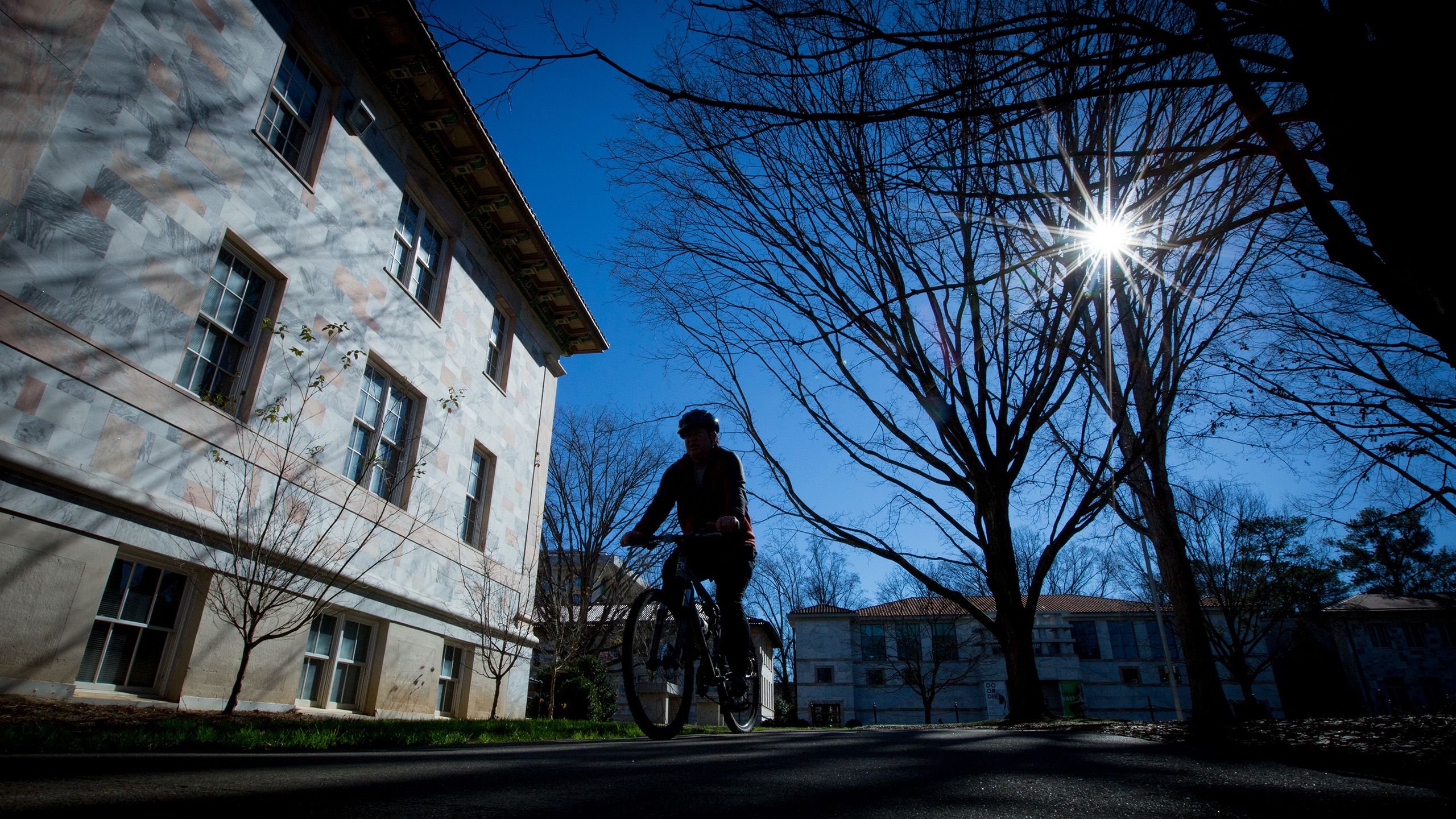2023
Looking back at Emory’s Most-Read Stories of the Year

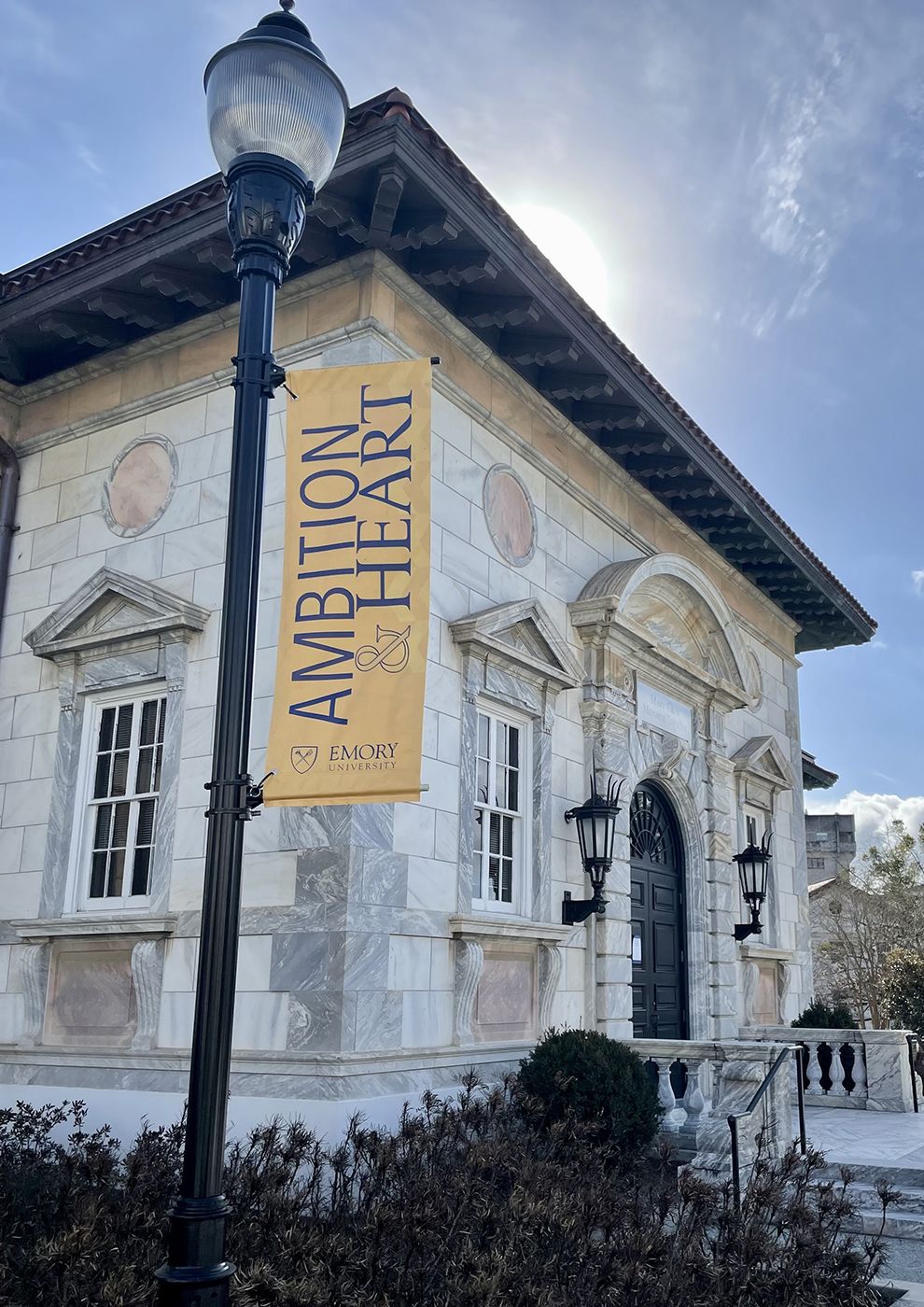
2023 began on an optimistic note, as the Emory community returned to campus right after the winter break for the first time since 2020, leaving behind two years of delayed starts due to the COVID-19 pandemic.
That hopeful spirit continued into February’s Charter Week celebration, as Emory President Gregory L. Fenves announced the reimagined and expanded One Emory: Ambition and Heart strategic framework, created to lead Emory into a new era.
The year brought major progress on key university initiatives, including AI.Humanity, Student Flourishing and the Twin Memorials project, which in September announced the selection of the acclaimed Hood Design Studio to design memorials on Emory’s Atlanta and Oxford campuses to honor the enslaved individuals who are part of the university’s history.
Now, as this year of ambition and heart draws to an end, take a look back at 10 of the most-read stories of 2023 from the Emory News Center, with more headlines if you want to delve deeper.
2023 began on an optimistic note, as the Emory community returned to campus right after the winter break for the first time since 2020, leaving behind two years of delayed starts due to the COVID-19 pandemic.
That hopeful spirit continued into February’s Charter Week celebration, as Emory President Gregory L. Fenves announced the reimagined and expanded One Emory: Ambition and Heart strategic framework, created to lead Emory into a new era.
The year brought major progress on key university initiatives, including AI.Humanity, Student Flourishing and the Twin Memorials project, which in September announced the selection of the acclaimed Hood Design Studio to design memorials on Emory’s Atlanta and Oxford campuses to honor the enslaved individuals who are part of the university’s history.
Now, as this year of ambition and heart draws to an end, take a look back at 10 of the most-read stories of 2023 from the Emory News Center, with more headlines if you want to delve deeper.
1. Research breakthroughs, from treating depression to pursuing a cure for HIV
Emory faculty, staff and students continue to expand knowledge through research in the health sciences, humanities, social sciences, natural sciences and more.
The most-read Emory story of the year — with almost 120,000 pageviews — centered on research related to an area of wide interest: depression. Numerous labs around the world have shown that inflammation in the brain affects the brain’s “reward” pathways and causes reduced motivation and anhedonia, a core symptom of depression. The Emory study showed that a drug that increases dopamine in the brain has potential to reverse the effects of inflammation on brain-reward circuitry, ultimately improving symptoms of depression.
Readers were also highly interested in Emory research focusing on new findings in the pursuit of an HIV cure and how the extracts from two common plants — goldenrod and eagle fern — might inhibit the COVID-19 virus.
Want to read more? Here is a sampling of other research headlines from 2023:
- ENRICH study leads to first positive surgical trial in the deadliest type of stroke
- Buffalo slaughter left lasting impact on Indigenous peoples
- Lost in a brain fog
- Physicists open new path to an exotic form of superconductivity
- ‘A Story Grows in Uganda’ combines storytelling traditions, shows that literacy research flourishes at Emory
- Emory researchers discover early indicators of Alzheimer’s disease in two new studies
- Analyzing ways to help golden eagle populations weather wind-energy growth
- Birds set foot near South Pole in Early Cretaceous, Australian tracks show
2. First lady Jill Biden visits Emory to learn about research to ‘cure the uncurable’
First lady Jill Biden visited Emory Sept. 15 to learn about groundbreaking research focused on training the immune system to treat, prevent and cure cancers and other diseases. Biden toured the lab of Emory professor Philip Santangelo, whose team is working to develop new mRNA-based drugs to “turn on” or “turn off” genes in individual immune cells.
“As a mom who watched my son die of cancer, the one thing I never gave up on was hope. As a mother, you can’t,” Biden said after the tour. “This work gives families the power to hold on to that hope just a little bit longer. Because this work could change lives.”
In August, President Joe Biden announced that a new federal agency within the U.S. Department of Health and Human Services has selected Emory as the first recipient of new funding to support transformative biomedical and health breakthroughs. The three-year, $24.8 million cooperative agreement from the Advanced Research Projects Agency for Health (ARPA-H) supports the goals of the Biden Cancer Moonshot.
“Over the past few years, COVID-19 vaccines developed using mRNA technology have saved millions of lives around the world,” the president said in the announcement. “Now, a skilled team at Emory University in Atlanta will work to adapt these technologies to turn more cancers into curable diseases. This is a bold endeavor that has the potential to transform the fight against cancer and other difficult diagnoses.”
Santangelo is a professor in the Wallace H. Coulter Department of Biomedical Engineering at Emory and Georgia Institute of Technology, and a researcher at Winship Cancer Institute of Emory University.
“What we have zeroed in on is that one of the commonalities among many, many diseases that afflict Americans is immune dysregulation. That is important in cancer, autoimmune diseases and other diseases,” he explained to the first lady during the tour. “So we want to basically develop mRNA drugs that would allow us to tune the immune system.”
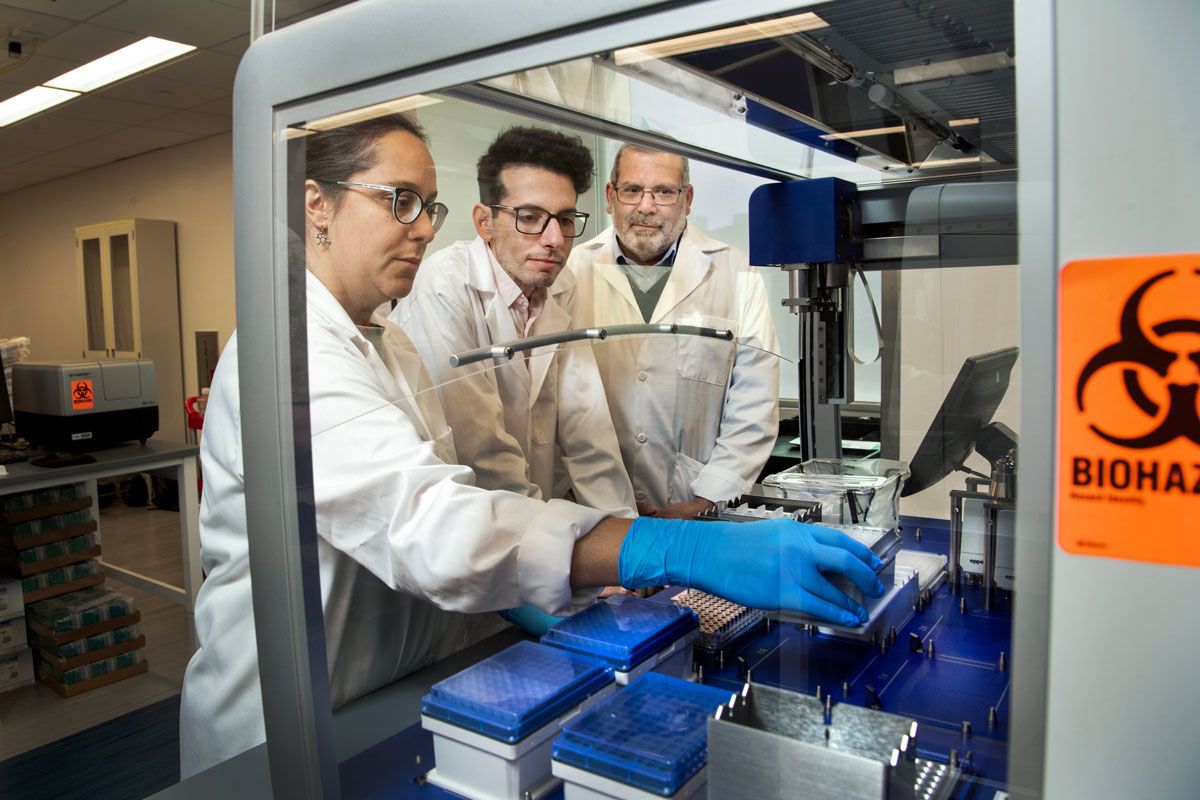
The lab of Emory professor Philip Santangelo (right) is working to develop a novel class of mRNA-based drugs to precisely “turn on or turn off” genes in individual immune cells.
The lab of Emory professor Philip Santangelo (right) is working to develop a novel class of mRNA-based drugs to precisely “turn on or turn off” genes in individual immune cells.
Receiving the first grant from ARPA-H is both a huge honor and a reflection of the way Emory approaches its mission, Emory President Gregory L. Fenves noted during a press conference after the tour: “At Emory, it isn’t enough to simply accomplish something great, to reach a goal or earn recognition. We measure our success through lives changed and lives saved.”
3. New spaces and programs nurture student flourishing
As part of the Student Flourishing initiative, which is actively creating ways for students to find academic, professional and personal success, many new programs and opportunities to nurture the “whole student” launched in 2023.
Designed with input from students, Campus Life’s Belonging and Community Justice Identity Spaces opened on the third floor of Cox Hall in October during Homecoming and are already enhancing a community for students across identities and experiences. The new spaces for the Asian Student Center, Center for Women, Centro Latinx, Emory Black Student Union, the Office of LGBT Life and Emory First, a support office for first-generation college students and students from low- and limited-income backgrounds, provide a vibrant location for students to engage, connect and explore intersectionality of communities.
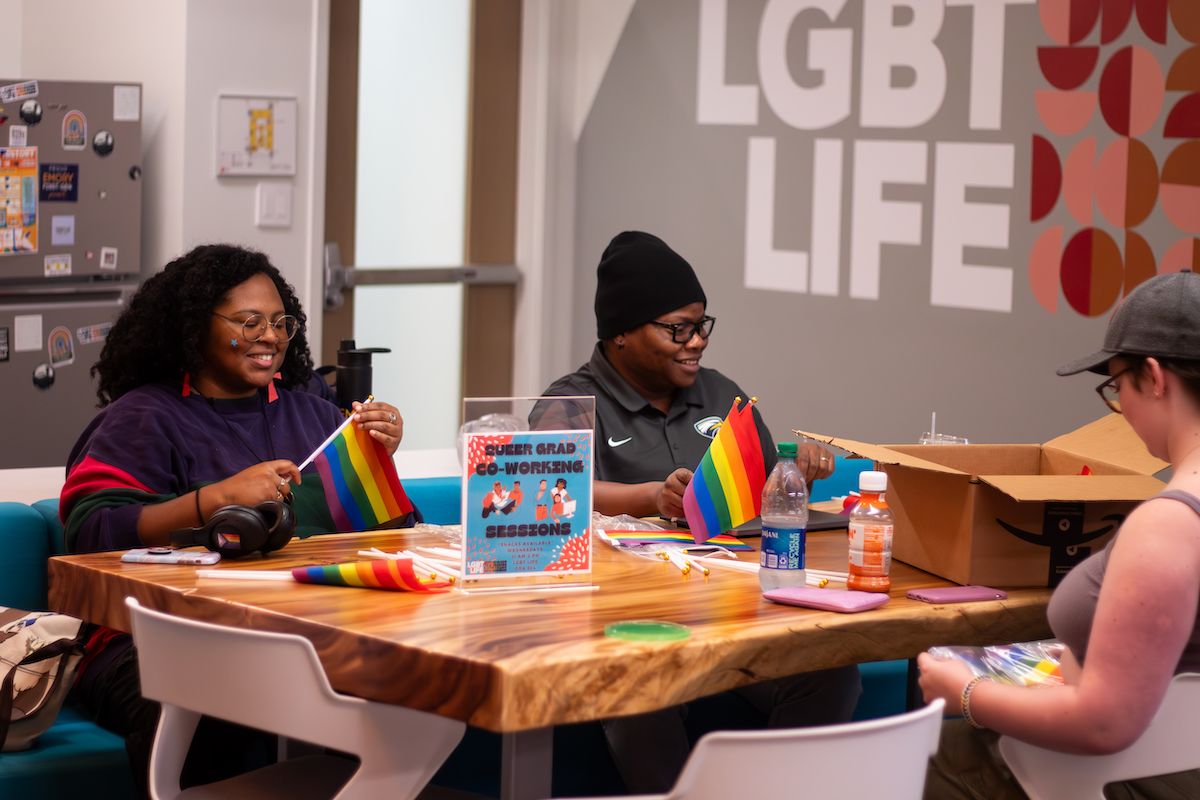
The Office of LGBT Life is part of the new Belonging and Community Justice Identity Spaces.
The Office of LGBT Life is part of the new Belonging and Community Justice Identity Spaces.
The Emory Interfaith Center, supported by the Office of Spiritual and Religious Life, also celebrated a grand opening during Homecoming weekend. Located in a renovated house on North Decatur Road, the Interfaith Center welcomes people across faiths (and even no faith at all) to foster better mutual understanding and find common ground. Cozy and welcoming, the center has a multifaith team of chaplains spanning Buddhist, Christian, Hindu, Jewish and Muslim faiths. Students are encouraged to build relationships across differences in faith and worldview and explore universal questions of meaning and purpose.
The Emory Purpose Project also expanded opportunities for students, faculty and staff to engage in purposeful reflection in the classroom and beyond, with the addition of purpose modules in Health 100 and ECS 101 and workshops led by Ira Bedzow, who became the project’s director in summer 2023.
Other academic opportunities launched this year included a new business minor for Emory College students, a new interdisciplinary AI minor open to all undergraduates, and Emory College’s new General Education Requirements designed to enhance intellectual exploration, experiential learning, communication, community and student success. Meanwhile, Emory’s new Undergraduate Council is evaluating university policies and practices to promote student flourishing with a focus on retention and graduation rates, student surveys and financial aid.
Through the Pathways Center and the Oxford Center for Pathways and Purpose, Emory students have participated in opportunities to explore personal development and professional career opportunities this year. Over the summer, a cohort of students participated in the Pathways Scholars’ pilot eight-week program in Los Angeles to look at the entertainment industry, social media and other forms of digital engagement.
Additionally, a new fund fueled by donors to Emory’s Pathways Center helped 274 students say “yes!” to summer internships on six continents. The cohort represented 47 different majors across the university’s four undergraduate colleges, and each student returned to campus with eye-opening experiences to share.
Watch highlights from the Media & Entertainment Pathways Scholars Program in Los Angeles.
Emory’s athletics teams also flourished in 2023, including an NCAA championship for the men’s swimming and diving team — their second-straight NCAA Division III title. To celebrate the victory, the team was invited to visit the White House as part of the first-ever College Athlete Day.
2023 also brought University Athletic Association (UAA) championships for Emory’s men’s swimming and diving, women’s swimming and diving (which was also national runner-up in the NCAA DIII), baseball, men’s soccer and men’s golf teams.
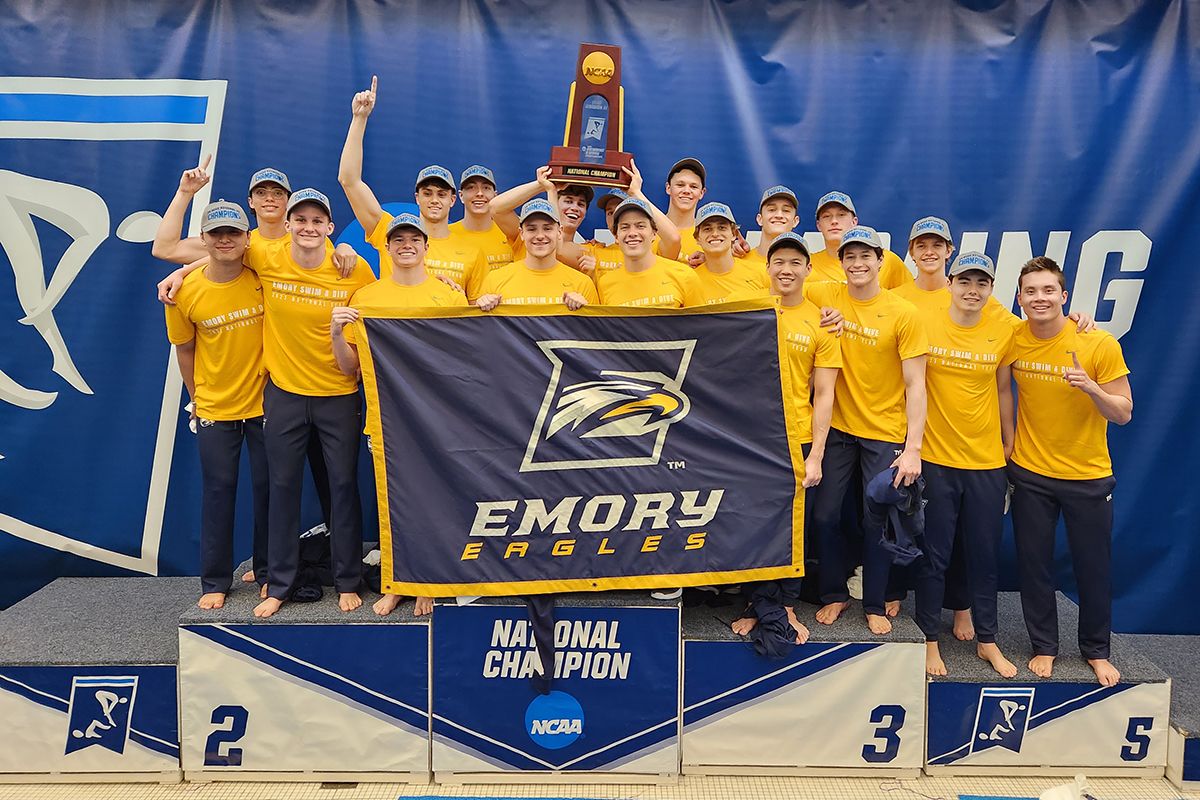
Emory's men's swimming and diving team won then 2023 NCAA DIII national championship.
Emory's men's swimming and diving team won then 2023 NCAA DIII national championship.
4. Big strides for Emory’s AI.Humanity initiative
Artificial intelligence (AI) is a part of everyday life — and Emory’s groundbreaking AI.Humanity initiative, first launched in 2022, made further progress this year toward ensuring that the human factor remains a critical piece of the technology equation.
The Emory Empathetic AI for Health Institute (or Emory AI.Health), which launched this November, will be integral to those efforts, uniting the power of machine learning and big data to transform the ways in which health care systems prevent, diagnose, treat and cure diseases on a global scale.
Interest in — and the importance of — AI’s impact on health care was underscored during Emory’s first AI.Health symposium, held Nov. 14-15. Over the course of two days, more than 450 participants learned about and discussed health care diagnosis, genomics, medical privacy, creating bias-free databases and more.
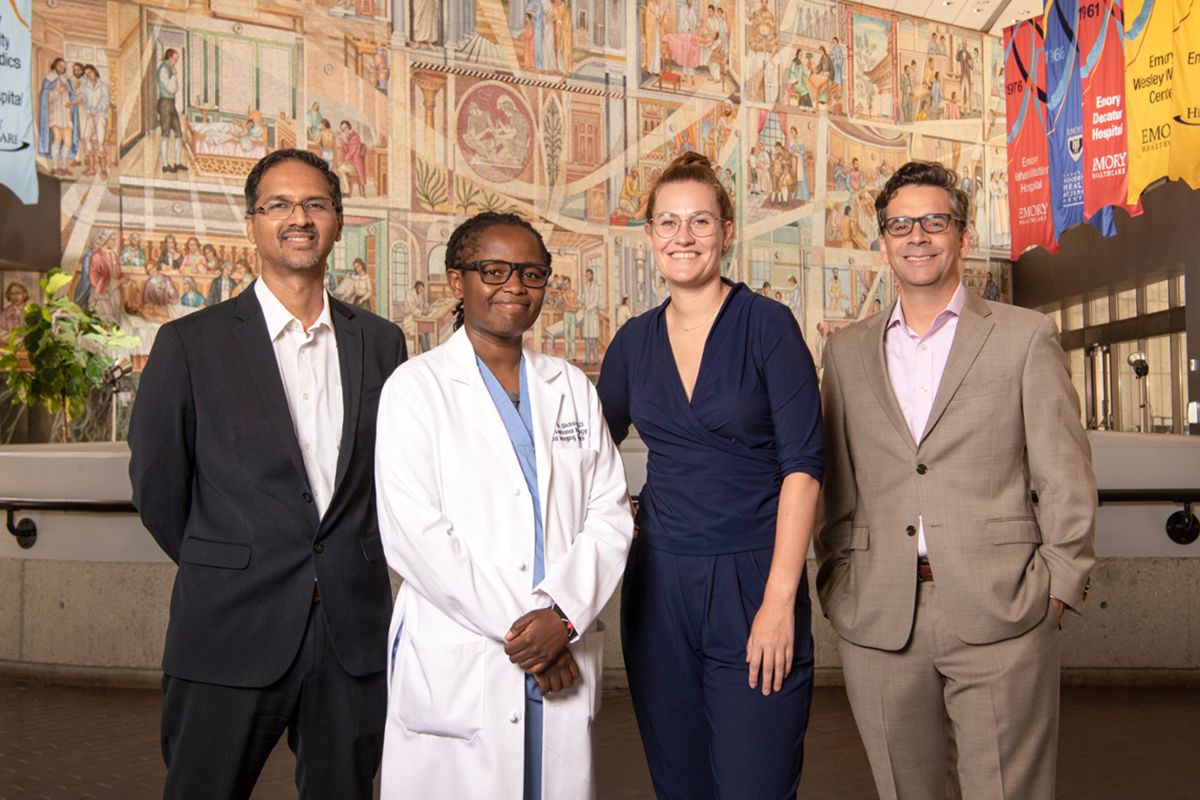
Faculty associated with Emory AI.Health are working to improve the detection, diagnosis, prognosis and prediction of treatment for more than two dozen conditions, including multiple types of cancer, diabetes and kidney disease.
Faculty associated with Emory AI.Health are working to improve the detection, diagnosis, prognosis and prediction of treatment for more than two dozen conditions, including multiple types of cancer, diabetes and kidney disease.
But AI isn’t only for researchers or data experts. This fall, the university introduced a minor in AI that’s open to all Emory undergraduate students. The program is tailored to students intent on technical careers as well as those who want a fundamental understanding of what AI is, how it can be used, its intended and unintended consequences and — most important — its interplay with human, societal and ethical issues such as fairness and bias.
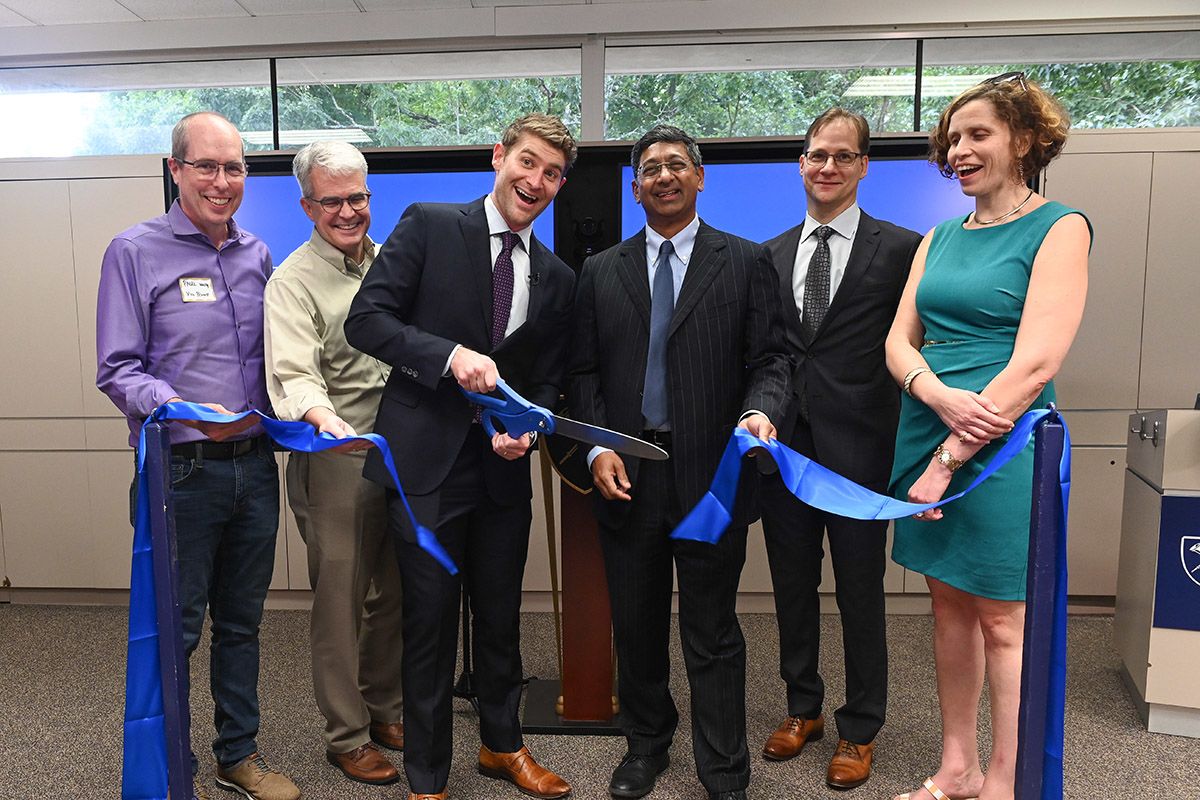
The Center for AI Learning celebrated its grand-opening with a ribbon cutting on Sept. 19.
The Center for AI Learning celebrated its grand-opening with a ribbon cutting on Sept. 19.
Fall semester also brought the opening of Emory’s Center for AI Learning, a community hub dedicated to advancing AI literacy across the university. The center’s initial programming included an AI.Humanity Seminar Series featuring TED-style talks delivered by Emory faculty, student-led workshops and networking events.
Fueling these efforts, in 2023 the university welcomed 19 new faculty members as part of the AI.Humanity initiative. That brings Emory’s total of new faculty in AI-related areas to 39, with plans in place to support the hiring of up to 60. Up next: AI.Humanity recruitment in 2024 concentrating on the areas of AI ethics, policy and regulation.
Other AI headlines from 2023 include:
- Emory boosts computing infrastructure to drive AI.Humanity initiative
- ‘The best kind of challenge’: Emory students join international simulation to debate AI and health inequities
- New AI-based biomarker can help predict immunotherapy response for patients with lung cancer
- New multi-institutional network will explore the intersection of AI, humanities and social justice in Atlanta
- Emory Center for AI Learning names Joe Sutherland as inaugural director
- AI model enables earlier detection of diabetes through chest x-rays
5. Welcoming the Class of 2027, bringing unique perspectives, hopes and dreams to Emory
This fall, the 1,955 members of Emory’s Class of 2027 began their new journeys at Emory College and Oxford College. This cohort, chosen from an undergraduate applicant pool of 33,534 and a total of 5,445 admitted students, is deeply invested in community and the arts.
In fact, more than half of the class attended a pre-orientation program, driven by shared values in identity, academics or interests, to get a jump-start on community-building this fall. Students in the class represent 49 states, plus the District of Columbia, Puerto Rico and the Virgin Islands, along with 67 other countries.
View highlights from Move-In Days for the Class of 2027.
Across the Atlanta and Oxford campuses, first-generation student enrollment increased in 2023. First-generation students make up 16% of the Atlanta campus class and 15% of the Oxford campus class. First-year students on the Atlanta campus speak 55 unique languages at home and 19% of students are international. On the Oxford campus, 45 unique languages are spoken at home and 20% of the first-year class is international.
Want to know more about the Class of 2027? Meet 12 first-year students — burgeoning scientists, activists and civic leaders — who are chasing big dreams for the future and have their sights set on making the world they’re inheriting a better place.
In December, Emory welcomed the first members of the Class of 2028, thanks to the QuestBridge and Early Decision programs. Watch their excited reactions upon being admitted to Emory.
6. Commencement, Match Day and more milestones across campus
Although some milestones — like Commencement — happen each year, they continue to carry enormous impacts for students, loved ones and the wider community.
On May 8, the Emory Class of 2023 closed this chapter of their lives to the sound of cheers erupting across the Quad.
“This is a day that has been years in the making,” said President Gregory L. Fenves. “It started with a dream, a goal, a thought that you could reach this level and earn a degree from one of the finest universities in the world.
“Along the way, there was inspiration, discovery, self-knowledge and moments that shaped you and changed you forever,” Fenves said. “Class of 2023, each one of you has a story. A path that is singular. And only you understood what it took to achieve your goal.”
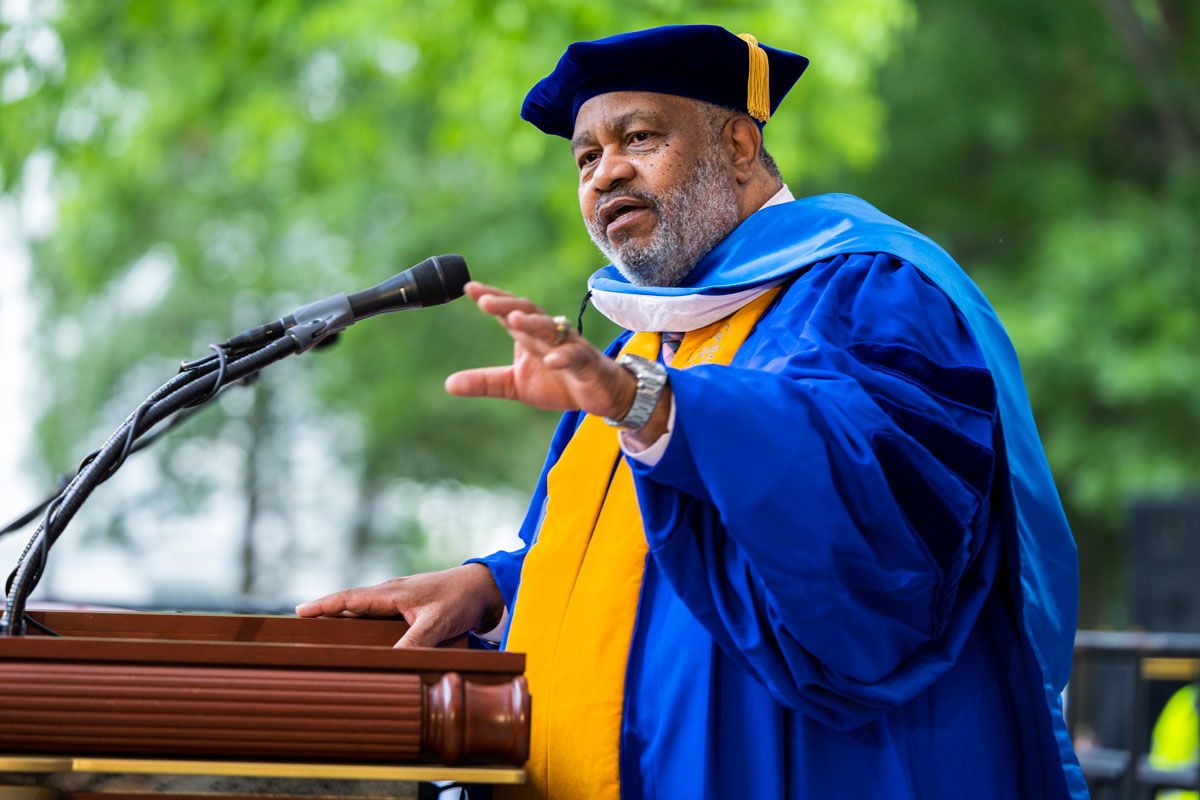
Commencement speaker Anthony Ray Hinton, author of the New York Times best-selling book “The Sun Does Shine: How I Found Life and Freedom on Death Row,” received an honorary Doctor of Letters degree from Emory.
Commencement speaker Anthony Ray Hinton, author of the New York Times best-selling book “The Sun Does Shine: How I Found Life and Freedom on Death Row,” received an honorary Doctor of Letters degree from Emory.
Activist, writer and justice advocate Anthony Ray Hinton, the keynote speaker, spent 30 years on Death Row in Alabama for crimes he didn’t commit. Hinton, who has become a tireless advocate for abolishing the death penalty, offered words of inspiration to the graduates.
“Tomorrow is a new dawn. You’re going to fall, but I beg you to get up,” said Hinton. “Your plan will not always proceed the way you planned it in your mind. Life will throw you a curve. I know for a fact that at the age of 29 it threw me a curve that I was not expecting. But I truly believe that all of us are born with the instinct to survive whatever comes our way.”
Watch highlights of Emory's 2023 Commencement ceremony.
Two more milestones — out of many — that the Emory community celebrated together in 2023:
On March 17, students in the School of Medicine rushed forward to learn their Match Day results. Gathered with their peers and loved ones, students discovered where they had matched for their residencies, excitedly tearing open the envelopes. This year’s rite of passage also introduced a new tradition that has been part of other Emory celebrations: the Coca-Cola Toast.
See the moment when Emory medical students found out where they matched for their residency training.
In November, actor, producer, activist and scholar Yara Shahidi ushered in the 42nd-annual Carter Town Hall. This year’s event, which was held in the Emory Student Center, was open to all students — not just first-years.
The tradition began in 1982 when former U.S. President Jimmy Carter became an Emory University Distinguished Professor. For 38 consecutive years, Carter was the sole keynote speaker, offering his wit and wisdom in response to student questions. Now, the time-honored event gives students the chance to engage in conversation with international thought leaders.
Shahidi, who recently graduated from college herself, held the unique role of peer and thought leader. She encouraged students to open their worldview, give themselves grace and dig into community.
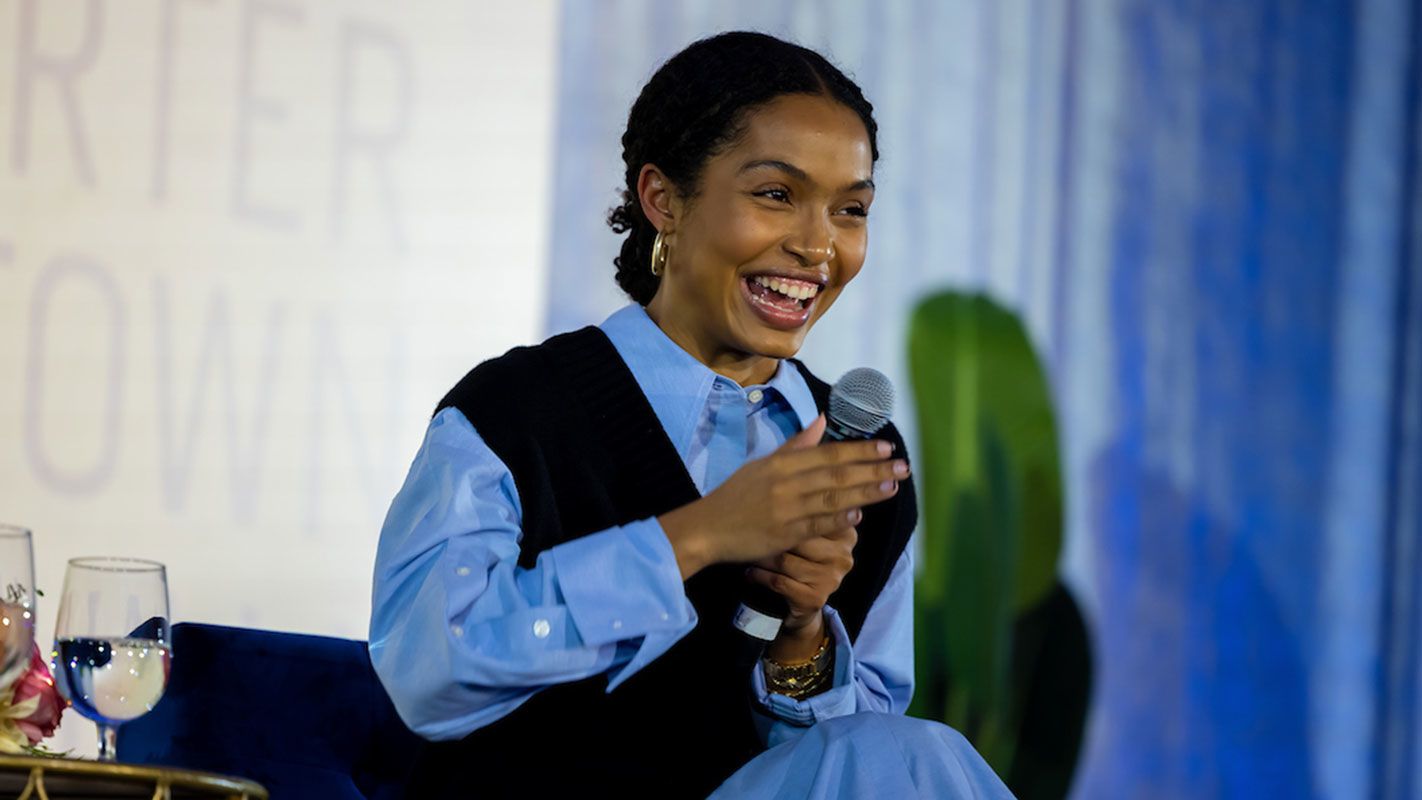
“Life really informed my academia, and I don’t think I would have been as good of a scholar, as good of a community member, had I not made space for the things that brought me joy, made space for the concerts and the community moments.” — Yara Shahidi
“Life really informed my academia, and I don’t think I would have been as good of a scholar, as good of a community member, had I not made space for the things that brought me joy, made space for the concerts and the community moments.” — Yara Shahidi
7. Emory ranks among the nation’s best universities and best hospitals
In 2023, Emory University remained among the nation’s top universities, ranking 24th in U.S. News & World Report’s 2024 Best Colleges report. The rankings also listed Emory University as 21st among its “Best Value” schools based on a combination of academic quality and cost.
Several of Emory’s undergraduate programs across different schools were also recognized. The Nell Hodgson Woodruff School of Nursing ranked 3rd this year for “Best Undergraduate Nursing” program and Goizueta Business School ranked 13th for “Best Undergraduate Business” program. Both schools are ranked separately from the university’s main undergraduate program based on surveys of deans and senior faculty from schools and departments across the country.
Other graduate and professional schools across Emory’s campus also ranked among the best in the nation this year, according to U.S. News & World Report. The annually distributed list uses data to rank programs in schools of nursing, public health, business, engineering and other areas. Additional information was later released to include rankings for schools of law and medicine.
Among the highlights:
- The Nell Hodgson Woodruff School of Nursing also ranked 1st in the nation for their master’s program and 6th for their Doctor of Nursing Practice program.
- The Wallace H. Coulter Department of Biomedical Engineering PhD program — a joint effort between Emory School of Medicine, Emory’s Laney Graduate School and Georgia Tech — ranked 1st in the nation.
- Rollins School of Public Health ranked 4th in the nation.
- Emory’s Physician Assistant program ranked 4th in the country.
For the second year in a row, Emory was honored with a Higher Education Excellence in Diversity Award, a national honor given by INSIGHT into Diversity Magazine that recognizes colleges and universities demonstrating an outstanding commitment to diversity and inclusion.
Emory also ranked among the nation’s top universities for recipients of federal research funding from the National Institutes of Health (NIH), according to FY2022 rankings from the Blue Ridge Institute for Medical Research, with Emory’s Department of Pediatrics, along with its clinical partner Children’s Healthcare of Atlanta, ranking 1st for NIH research grants.

Emory University Hospital ranked No. 1 in Atlanta and Georgia.
Emory University Hospital ranked No. 1 in Atlanta and Georgia.
Georgia’s top hospitals
Emory Healthcare was also recognized with high rankings this year for the excellent care provided to patients. For the 12th year in a row, U.S. News & World Report ranked Emory University Hospital as the No. 1 hospital in Georgia and metro Atlanta. Emory University Hospital also ranked on Newsweek’s list of the World’s Best Hospitals 2023.
Other hospitals in the Emory network were also recognized by U.S. News & World Report. Emory Saint Joseph’s Hospital ranked No. 2 in Georgia and metro Atlanta for the eighth consecutive year, while also being recognized with its seventh consecutive Magnet designation for nursing excellence. Emory University Hospital Midtown ranked No. 4 (a tie) in both Georgia and metro Atlanta rankings. For the first time this year, Emory Johns Creek Hospital ranked No. 8 in Georgia and No. 7 in metro Atlanta. Emory hospitals also ranked nationally or high-performing in several specialty areas.
Emory facilities also made up a large portion of Newsweek’s top hospitals in Georgia, with Emory University Hospital ranking No. 1, Emory Saint Joseph’s Hospital ranking No. 2, Emory University Hospital Midtown ranking No. 5, Emory Johns Creek Hospital ranking No. 6 and Emory Decatur Hospital ranking No. 16.
8. Emory ceremony honors Rosalynn Carter’s lifetime of public service
Hundreds of invited guests came to Emory’s Glenn Memorial United Methodist Church on Nov. 28 for the tribute service honoring the life and legacy of Rosalynn Carter, former first lady of the United States and a longtime advocate for mental health and myriad human rights issues.
Mrs. Carter, aged 96, passed away Nov. 19. In May, in keeping with her work to ease the stigma often associated with mental health issues, her family shared the news that Mrs. Carter had dementia.
President Carter, now 99 and in hospice care since February, traveled to Emory to attend the service for his beloved partner and wife of 77 years. The couple has worked closely with the university since 1982, when President Carter was named Emory University Distinguished Professor and they founded The Carter Center in collaboration with Emory.
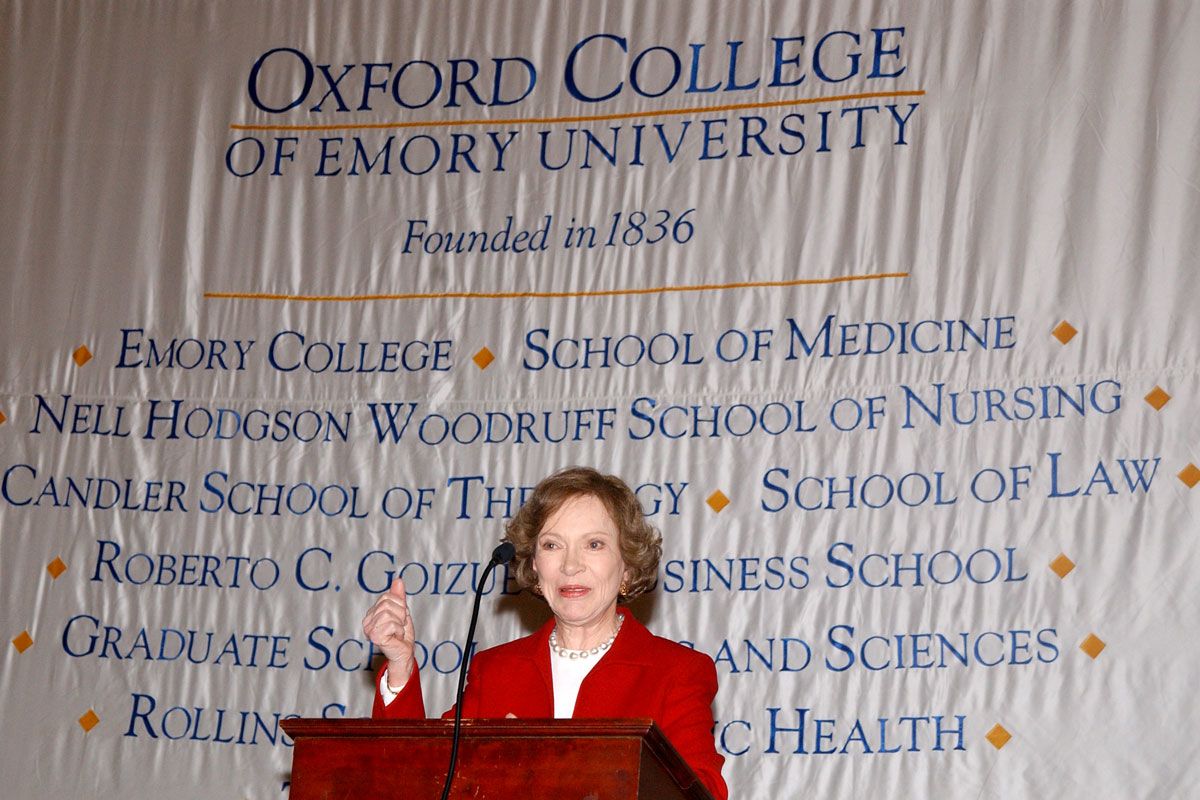
Rosalynn Carter speaking at Emory's Oxford College
Rosalynn Carter speaking at Emory's Oxford College
A powerful advocate in her own right, Mrs. Carter partnered for decades with Emory experts, uniting her vision of a more equitable health care system with the university’s strengths in research, training and service.
“Her tenure as first lady of the United States was just one chapter in a life that was really devoted to caring and doing good for others,” recalled speaker Kathryn Cade, Mrs. Carter’s friend and her director of projects in the White House.
The tribute service was attended by President Joe Biden and first lady Jill Biden, Vice President Kamala Harris and second gentleman Douglas Emhoff, former President Bill Clinton and former Secretary of State Hillary Clinton, and former first ladies Laura Bush, Michelle Obama and Melania Trump, as well as state and local officials including Georgia’s U.S. Sens. Raphael Warnock and Jon Ossoff, Georgia Gov. Brian Kemp, Atlanta Mayor Andre Dickens and former U.S. Ambassador Andrew Young.
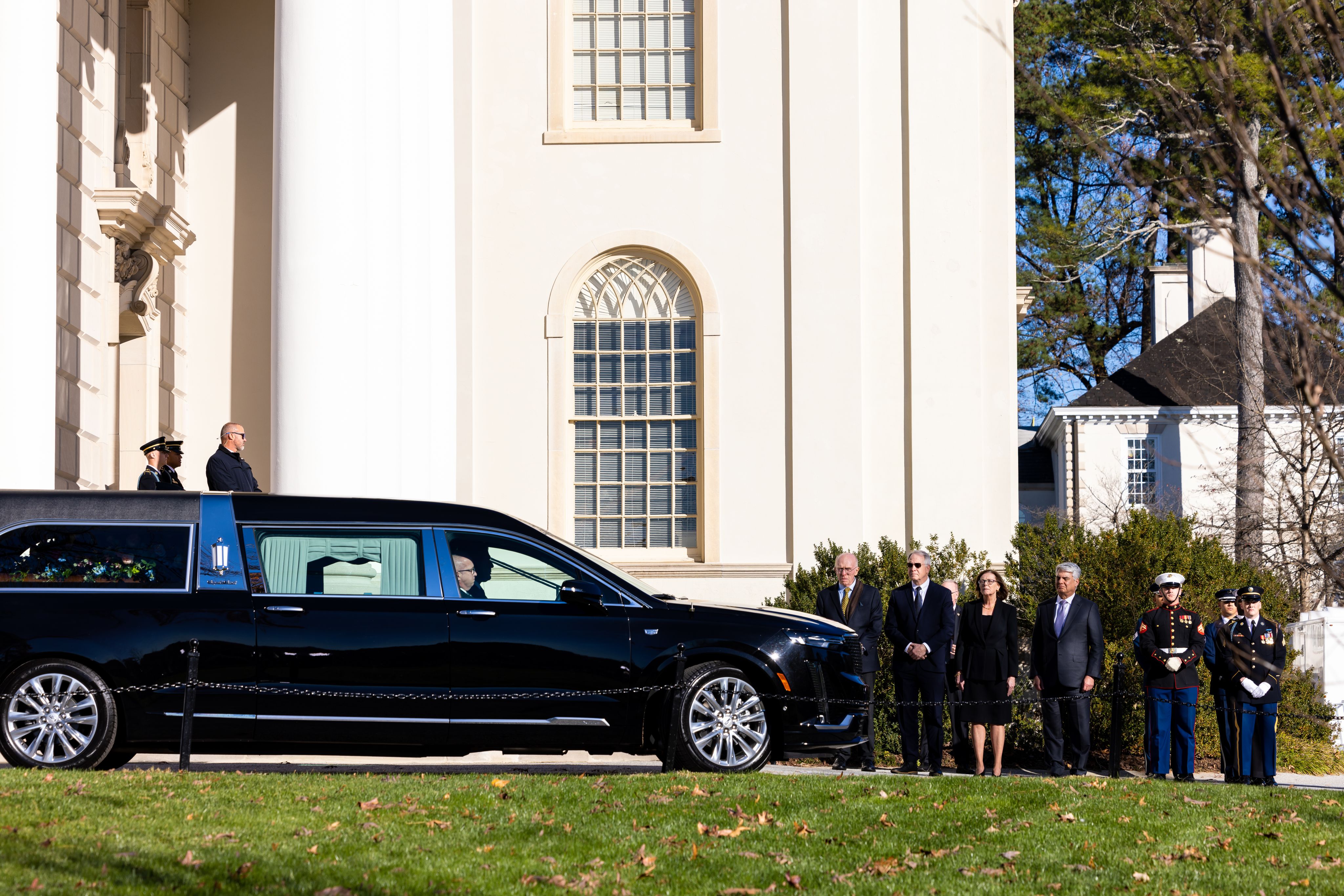
The current and former presidents of Emory pay their final respects to Mrs. Carter as her hearse prepares to depart from campus.
The current and former presidents of Emory pay their final respects to Mrs. Carter as her hearse prepares to depart from campus.
Since the service at Glenn Memorial was invitation only, Emory also hosted a gathering at Cannon Chapel for those on campus who wanted to pay their respects to Mrs. Carter by watching the televised ceremony together.
“She’s well-loved in the community. Everybody has pleasant things to say about her. I think her memory will live on,” said attendee Fran Anderson, a supervisor in Emory’s Building and Residential Services .“Hopefully, just for this day, we could all grow and learn from what she gave and what her life was about.”
9. New leaders help advance Emory’s mission
Emory welcomed new leaders in key roles across campus this year to enhance academic and health care offerings.
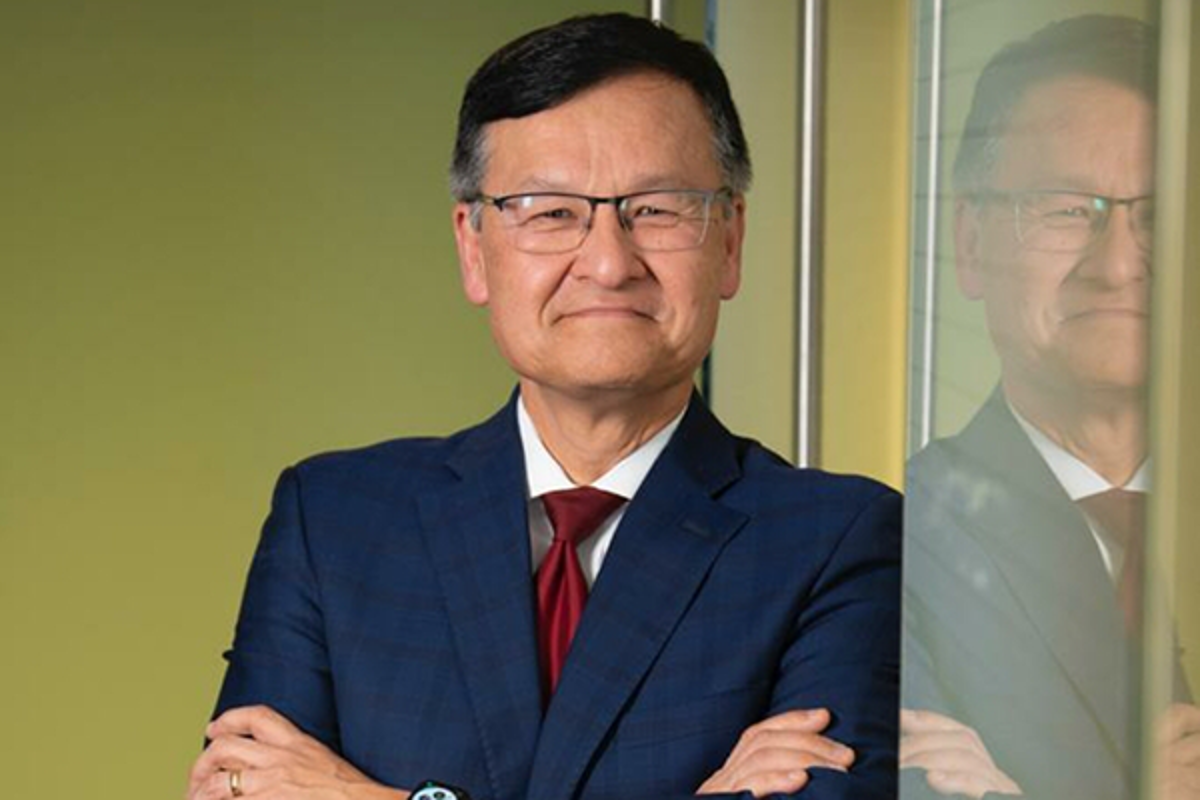
Emory Healthcare CEO Joon Sup Lee
Emory Healthcare CEO Joon Sup Lee
On July 1, Joon Sup Lee took the helm of Emory Healthcare as CEO. As such, he is responsible for overseeing the most comprehensive academic health system in Georgia with 11 hospitals, 250 provider locations and more than 24,000 employees. An interventional cardiologist by training, Lee’s research and clinical interests focus on the role of stem cells in the treatment of coronary artery disease, rapid treatment of cardiac emergencies and catheter-based therapy for valvular heart disease. He cites Emory’s storied tradition of discovery and innovation, its “endless potential” and its uniqueness as an academic medical center in a top-ten city as factors that drew him to Atlanta.
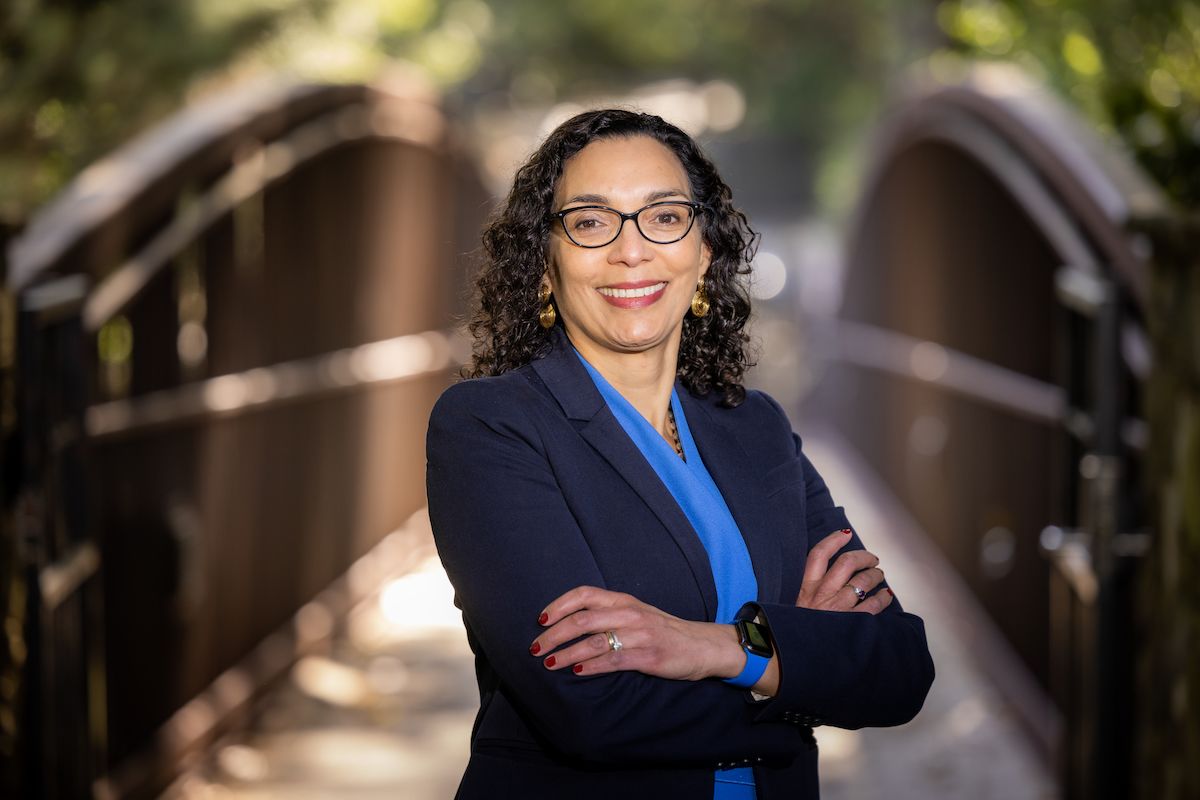
Emory College Dean Barbara Krauthamer
Emory College Dean Barbara Krauthamer
Also on July 1, Barbara Krauthamer became dean of Emory College of Arts and Sciences. A nationally regarded historian, Krauthamer is passionate about creating intellectual communities and conditions that help faculty, staff and students thrive and do their best work. Her awards include the 2013 NAACP Image Award for Outstanding Literary Work in Nonfiction (for the book “Envisioning Emancipation: Black Americans and the End of Slavery,” co-authored with Deborah Willis) and the Lorraine A. Williams Leadership Award from the Association of Black Women Historians in 2017 in recognition of both her scholarship and her work to create opportunities for Black women in higher education.
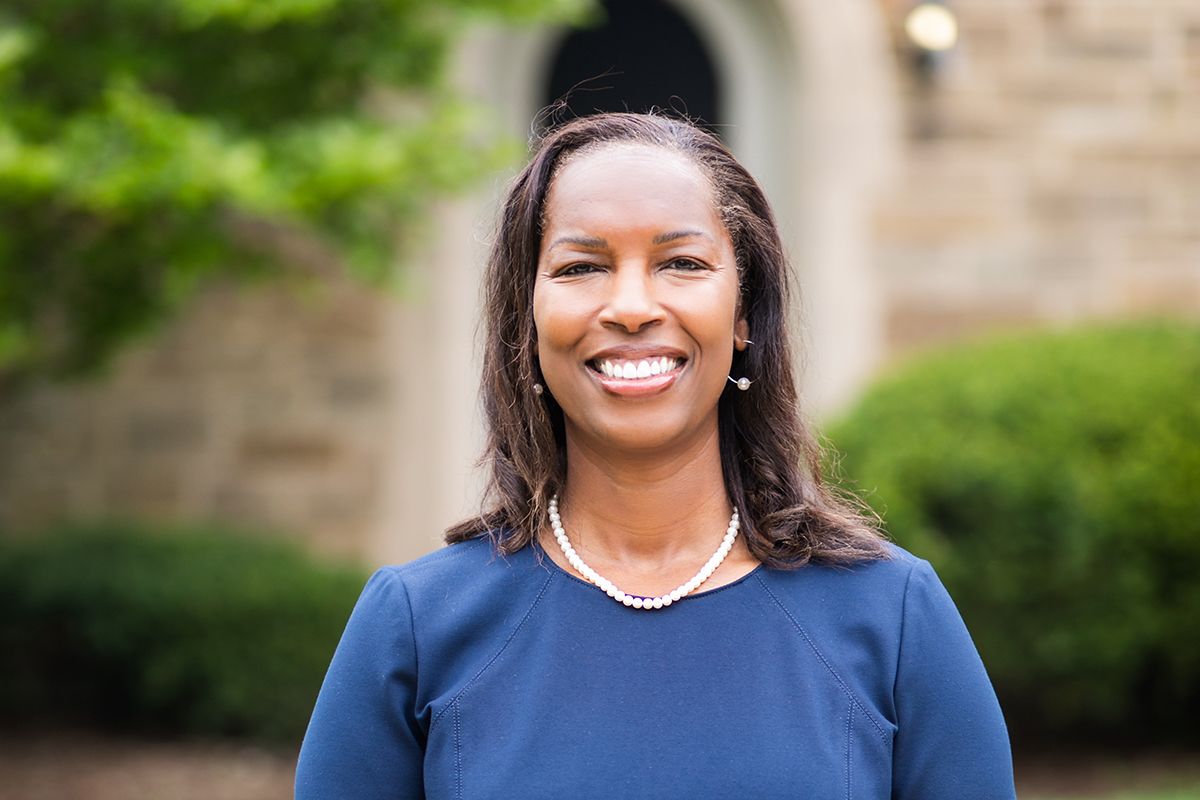
Oxford College Dean Badia Ahad
Oxford College Dean Badia Ahad
On Aug. 1, Badia Ahad became dean of Oxford College. Ahad has earned a national reputation as an expert on faculty development, but her leadership experience speaks to a commitment to developing outstanding scholars at all levels. Her personal research sits at the intersection of cultural studies and positive psychology, a field grounded in the idea that social good, well-being and flourishing are at the core of human experience. By combining those interests with Emory’s student-centered identity and commitment to Student Flourishing, Ahad looks forward to bolstering Oxford’s connections to the Atlanta campus and impacting educational practices.
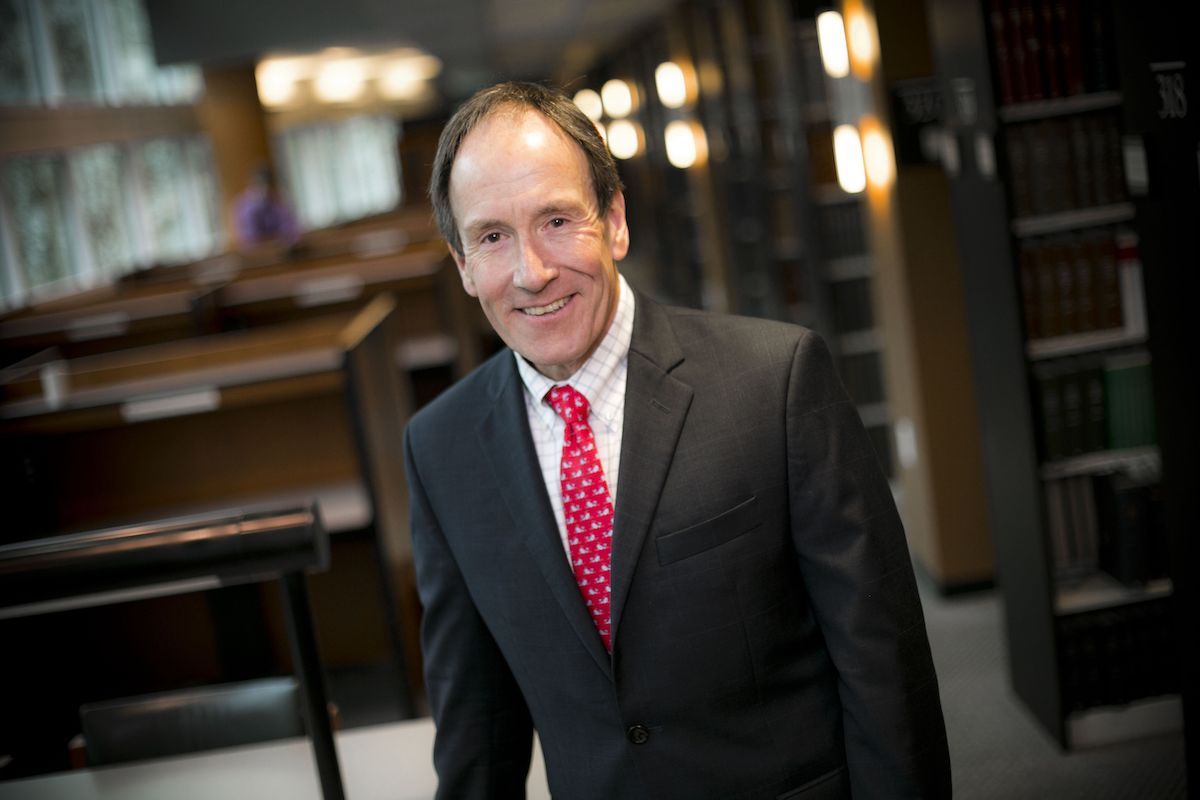
Richard Freer, the next dean of Emory Law
Richard Freer, the next dean of Emory Law
In November, Richard D. Freer, Charles Howard Candler Professor of Law, was appointed the next dean of Emory University School of Law. A renowned expert on civil procedure and an award-winning teacher and experienced leader, Freer has made considerable scholarly, administrative and pedagogical contributions during his 40-year tenure at Emory Law, all while continually evaluating students’ educational experiences and ensuring they are prepared for professional life. Freer’s priorities flow from the school’s core mission: to educate sophisticated, principled lawyers who can flourish in the practice of law anywhere. He will step into the role July 1, 2024, at the conclusion of Dean Mary Anne Bobinski’s five-year term.
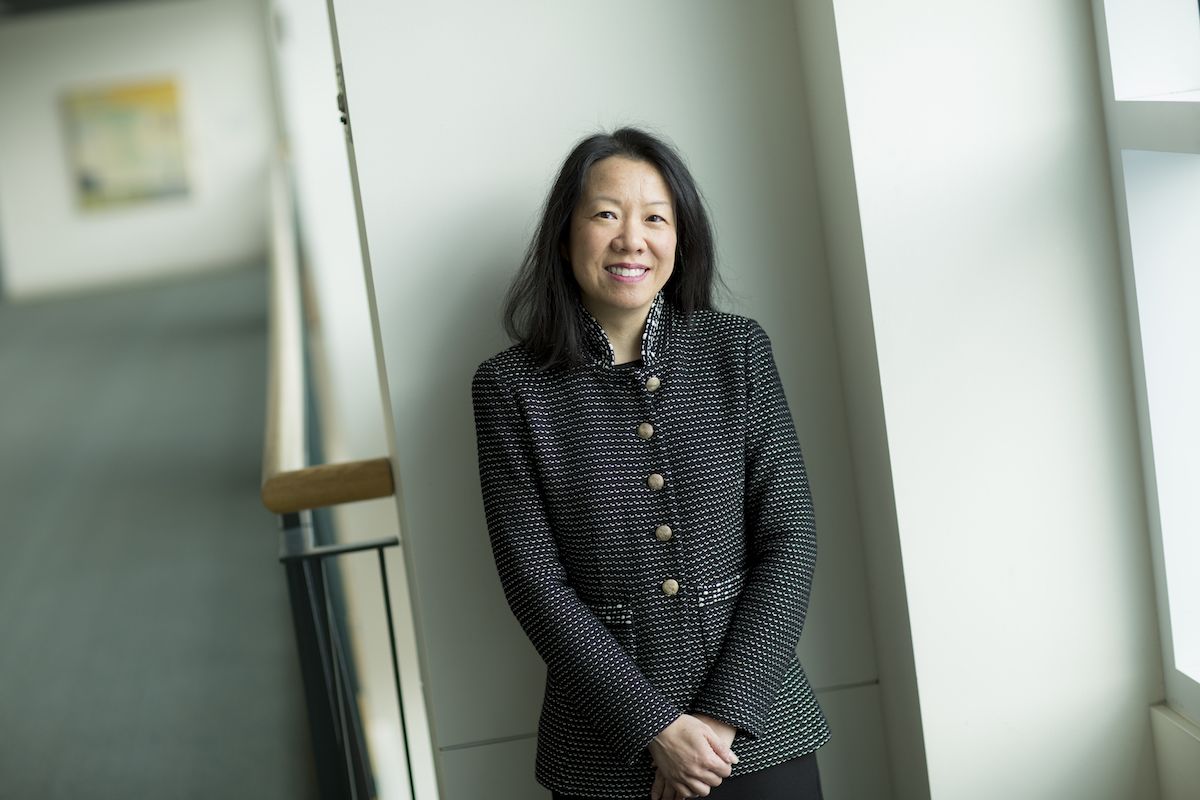
Sandra Wong, the next dean of Emory University School of Medicine
Sandra Wong, the next dean of Emory University School of Medicine
Also in November, Sandra L. Wong was appointed the next dean of Emory University School of Medicine and chief academic officer for Emory Healthcare. A surgical oncologist, Wong is among the most widely recognized health services researchers in academic surgery, with an extensive record of research funding and more than 250 peer-reviewed studies to her credit. Among other accomplishments, she is an editorial board member of the Journal of the American College of Surgeons and the Journal of Surgical Oncology. She will join Emory in March 2024 as the first female dean of the School of Medicine in university history.
In December, Emory announced new roles for three established leaders in public safety and administration. Emory Police Chief Cheryl Elliott will take on an expanded role as the university’s vice president for public safety, starting Jan. 1. Deputy Chief Burt Buchtinec has been named Emory’s next police chief, effective at the same time. Also starting Jan. 1, Diana Carter will serve as vice president and chief administrative officer.
Here is a sampling of other new leaders who joined Emory this year:
- Heather Dexter, president of Emory Healthcare Regional Hospital Division
- Amaka Eneanya, chief transformation officer for Emory Healthcare
- Alistair Erskine, chief information and digital officer for Emory Healthcare and vice president of digital health for Emory University
- Tenille Gaines, executive director of counseling and psychological services
- Kristina K. Bethea Odejimi, dean of students and associate vice president for belonging, engagement and community
- Jen Schuck, CEO of Emory Decatur Hospital, Emory Hillandale Hospital and Emory Long-Term Acute Care
- Sharon Stroye, director of truth, racial healing and transformation
- Joe Sutherland, director of the Emory Center for AI Learning
- Sara Tanner, executive director of communications and strategic initiatives, Campus Life
- Matt Wain, president of Emory Healthcare University Hospital Division
- Alex Wan, assistant vice president of community affairs
10. New buildings support cutting-edge research and patient care
Being at the forefront of research requires cutting-edge resources and facilities. This year held no shortage of innovation to celebrate, including the unveiling of Georgia’s largest health sciences research building in March. The Health Sciences Research Building II aims to further propel medical research through space that encourages collaboration among researchers working to solve the most complex human health problems.
The eight-story, 350,000-square-foot building houses more than 1,000 researchers, including 130 principal investigators, from across a variety of specialties including: pediatrics, biomedical engineering, Winship Cancer Institute, cardiovascular medicine, the Emory Vaccine Center, radiology and brain health.
It’s also an aesthetically pleasing space, with a light-filled atrium, living five-story green wall, digital collaboration screens, innovation spaces and more. Plus, the facility was built with sustainability in mind, designed to use roughly half (50%) of the energy a typical research facility requires.
“This magnificent facility will play a powerful role in fulfilling Emory’s mission to create, preserve, teach and discover,” said Ravi I. Thadhani, MD, MPH, Emory’s executive vice president for health affairs. “This building will facilitate breakthroughs and discoveries across the health sciences that will transform patient care and serve as a training ground for the next generation of clinicians and researchers.”
Just a few months later, in early May, the new Winship Cancer Institute at Emory Midtown opened for patients. With input from more than 160 patients, families and care team members, the Winship Cancer Institute of Emory University designed the full-service center to support a unique model of patient-centered, multidisciplinary cancer care integrated with innovative research to provide the best patient outcomes and a personalized experience.
Learn about the new Winship Cancer Institute at Emory Midtown
The care model brings outpatient and inpatient cancer care together in five “care communities” organized by type of cancer, with adjoining floors, shared living rooms and shared care teams of experts from multiple disciplines. Nearly all the services the patients need — from diagnostics and doctors’ appointments to infusions and support services — will be brought directly to them in the care community by multidisciplinary care teams specialized in their cancer type. Joining outpatient and inpatient care makes for a seamless transition if a patient is hospitalized.
“The opening of the new Winship at Emory Midtown is a milestone that we believe will set a new standard in cancer care now and for many years to come,” said Suresh Ramalingam, MD, executive director, Winship Cancer Institute of Emory University. “The new center perfectly complements our approach to cancer care, which centers around the patient, streamlining and personalizing their care while integrating research to bring them the very latest and most effective treatments.”
